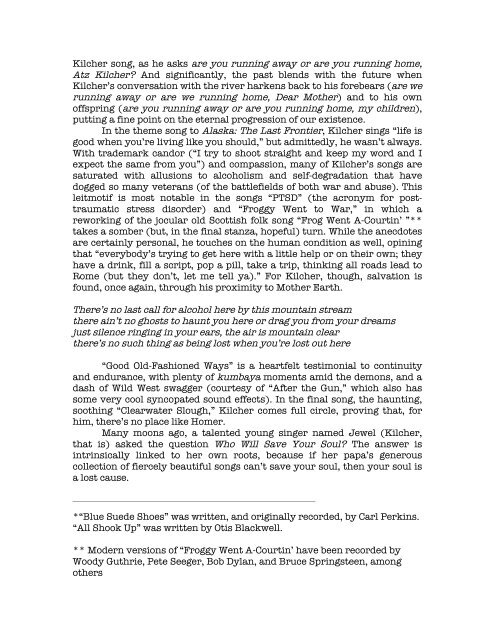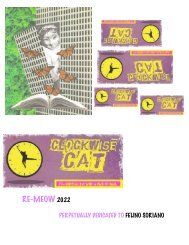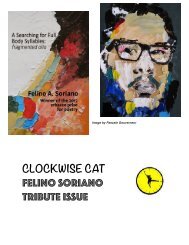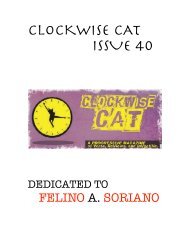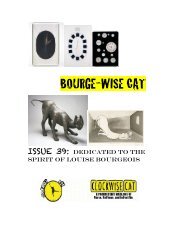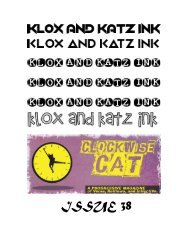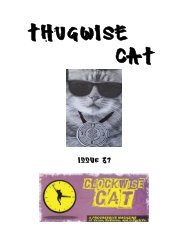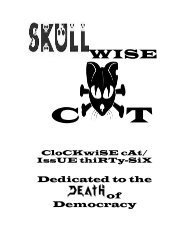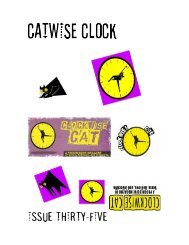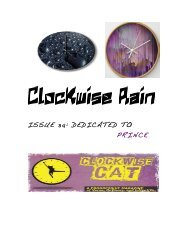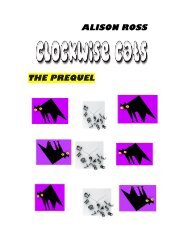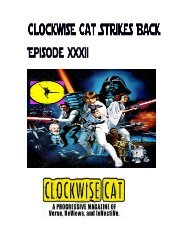StarCat/CatStar
StarCat/CatStar is dedicated to the memory of David Bowie, that cosmic subversive who’s returned at last to his ethereal home.
StarCat/CatStar is dedicated to the memory of David Bowie, that cosmic subversive who’s returned at last to his ethereal home.
Create successful ePaper yourself
Turn your PDF publications into a flip-book with our unique Google optimized e-Paper software.
Kilcher song, as he asks are you running away or are you running home,<br />
Atz Kilcher? And significantly, the past blends with the future when<br />
Kilcher’s conversation with the river harkens back to his forebears (are we<br />
running away or are we running home, Dear Mother) and to his own<br />
offspring (are you running away or are you running home, my children),<br />
putting a fine point on the eternal progression of our existence.<br />
In the theme song to Alaska: The Last Frontier, Kilcher sings “life is<br />
good when you’re living like you should,” but admittedly, he wasn’t always.<br />
With trademark candor (“I try to shoot straight and keep my word and I<br />
expect the same from you”) and compassion, many of Kilcher’s songs are<br />
saturated with allusions to alcoholism and self-degradation that have<br />
dogged so many veterans (of the battlefields of both war and abuse). This<br />
leitmotif is most notable in the songs “PTSD” (the acronym for posttraumatic<br />
stress disorder) and “Froggy Went to War,” in which a<br />
reworking of the jocular old Scottish folk song “Frog Went A-Courtin’ ”**<br />
takes a somber (but, in the final stanza, hopeful) turn. While the anecdotes<br />
are certainly personal, he touches on the human condition as well, opining<br />
that “everybody’s trying to get here with a little help or on their own; they<br />
have a drink, fill a script, pop a pill, take a trip, thinking all roads lead to<br />
Rome (but they don’t, let me tell ya).” For Kilcher, though, salvation is<br />
found, once again, through his proximity to Mother Earth.<br />
There’s no last call for alcohol here by this mountain stream<br />
there ain’t no ghosts to haunt you here or drag you from your dreams<br />
just silence ringing in your ears, the air is mountain clear<br />
there’s no such thing as being lost when you’re lost out here<br />
“Good Old-Fashioned Ways” is a heartfelt testimonial to continuity<br />
and endurance, with plenty of kumbaya moments amid the demons, and a<br />
dash of Wild West swagger (courtesy of “After the Gun,” which also has<br />
some very cool syncopated sound effects). In the final song, the haunting,<br />
soothing “Clearwater Slough,” Kilcher comes full circle, proving that, for<br />
him, there’s no place like Homer.<br />
Many moons ago, a talented young singer named Jewel (Kilcher,<br />
that is) asked the question Who Will Save Your Soul? The answer is<br />
intrinsically linked to her own roots, because if her papa’s generous<br />
collection of fiercely beautiful songs can’t save your soul, then your soul is<br />
a lost cause.<br />
____________________________________________________________<br />
*“Blue Suede Shoes” was written, and originally recorded, by Carl Perkins.<br />
“All Shook Up” was written by Otis Blackwell.<br />
** Modern versions of “Froggy Went A-Courtin’ have been recorded by<br />
Woody Guthrie, Pete Seeger, Bob Dylan, and Bruce Springsteen, among<br />
others


